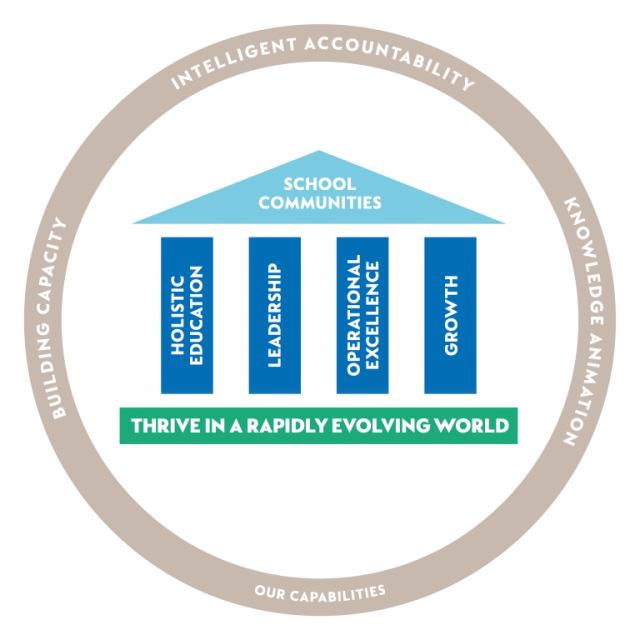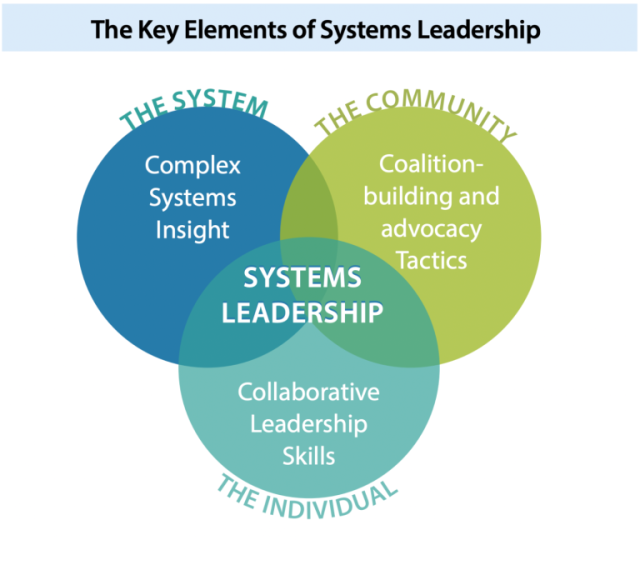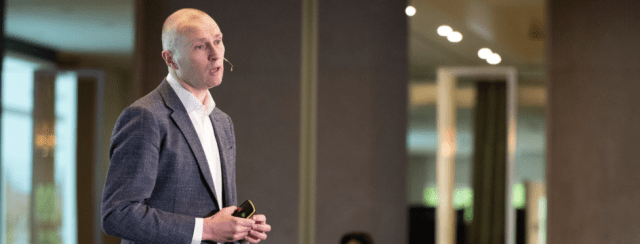IN THE SYSTEM, WHERE DO YOU BELONG?
There is increasing talk of systems in education. This is a change over the past 10+ years. Within Cognita, we now think of the global Cognita community as a system.
Cognita as a system
In its early life, Cognita was considered a group of schools. Our 2016 strategic framework reconceptualised Cognita as a schools group. We intentionally updated our thinking in 2022 to consider Cognita as a global schools system.

In thinking of Cognita as a global system, we adopt the following definition:
A system has interrelated parts that form a complex and diverse whole with a collective purpose.
The important elements of this definition are:
- The system is made up of interrelated parts, i.e. our schools are connected but also distinct in their own right, each with a unique personality.
- The organisation is complex and diverse, i.e. there is no one-size-fits-all approach.
- We have a collective purpose that supports coherence making, i.e. whilst each school is distinct, there is a binding purpose that acts as our north star.
At Cognita, we are very much an ‘open system’. An open system has flows of information, knowledge and much more, between the system and its environment, i.e. we are actively and intentionally open to our operating environment.

The Cognita Quality Framework
Our global framework provides our north star and guiding purpose. There are three elements to our Framework.
- Our global purpose enables our students and colleagues to ‘Thrive in a rapidly evolving world’. This is our North Star.
- Our four strategic pillars: Holistic Education, Leadership, Operational Excellence and Growth. These pillars are the work of our schools.
- Our three system capabilities: Intelligent Accountability, Knowledge Animation and Building Capacity. These are the work of the Cognita system, the force field around our schools.
System leadership
System Leadership is about how you lead across boundaries. This could be across schools, across a Cognita region or the Cognita group. It’s how you lead when you may not necessarily have formal line management responsibility and you need to influence others rather than pull a management lever.
The World Economic Forum identify three key elements of Systems Leadership in this handy visual.

My own reflections
Over the past year, I have had many conversations with Cognita colleagues about what it means to be a system leader. This is a very frequent conversation when someone moves from a school role into a regional or group role. I have learned, over time, that whilst some leadership competencies and skills are generic; others are more situational or context specific. This has helped me understand why some people do not enjoy or flourish when they move from a school or institutional leadership role into a system role.
It is 20 years since I first worked in a system leadership role. Over this time I have learned from some talented colleagues. Like most learning, you learn what to do as well as what not to do. These are a few lessons from my work as a systems leader.
Ambiguity
In a system leadership role, ambiguity is everywhere. You are often dealing with a partial picture; often accompanied by complex reporting and organisational structures. Whilst this is common in many leadership roles, my own experience is that this is dialled up when in system leadership role vs institutional leadership role. Indeed, I have seen some amazing people flounder as system leaders and it is often because they struggle with the ambiguity and not being the positional leader.
Influence
Influence is, for me, at the heart of leadership. But influence can be non-tangible and nuanced. There are many ways to influence others and we all need to find our own way with this. For me, influence is closely connected with knowing your colleagues and your audience. I intentionally aim to influence people in different ways, knowing that there is no one-size-fits all approach. There are two broad types of influence:
- Transactional influence is often used in top-down, hierarchical organizations and is focused on the tasks to be done. This kind of leader is often direct and to the point.
- Transformational influence is rooted in empathy and is often seen in more flat organizations. This kind of leader relies on encouragement and support to motivate and inspire others.
I guess there are occasional times when transactional influence may be of use. Overall, the second type of influence is needed for sustained impact. The ultimate internal question I ask myself is ‘will I have helped impact thinking and change’ beyond me being here? What will be different as a result of this interaction?
Dive in, get out
In a system leadership role you need to be able to move from macro to micro, quickly, and return. In conversation with my great colleague David Baldwin in Dubai, he likened this to a kingfisher bird that can hover, dive into the water and exit from the water almost as quickly. As a system leader you often need to ‘dive down’ into the system to test out facts or assertions.
A key skill here is being able to get yourself out of the detail and back to big picture. I have seen system leaders ‘dive in’ and stay. This is either because getting out was difficult or they were in their comfort zone. My own learning is that staying in the system doesn’t ultimately develop the system as a whole.
Trust
It may be obvious, but everything about system leadership is built on trust. No trust equals limited impact. We live in a world that is rapidly changing. There is something comforting about the fact that most things can be done more quickly using technology but trust is something that transcends this. There are rarely shortcuts to building trust. This is nicely summed up by the Dutch proverb:
‘Trust arrives on foot and leaves on horseback’.
Trust is built by investing in people, believing in them and supporting them. Above all, working hard to understand the world from their perspective.
Summary
I love working in a system leadership role and feel hugely privileged to do so. I work with some incredible people and I constantly learn. It isn’t for everyone and that’s OK. Some people are far better suited to leading institutions. We are all different and can bring different skills. Whatever our role, hopefully we can all do good as we go. Together, we are stronger.
‘Trust arrives on foot and leaves on horseback’.
Trust is built by investing in people, believing in them and supporting them. Above all, working hard to understand the world from their perspective.
References
Author
Dr Simon Camby is the Chief Education Officer at Cognita. Simon works with our Regional Education Directors and regional teams to ensure that we live out our purpose of enabling our students to thrive in a rapidly evolving world.
















